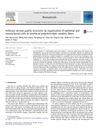18 citations,
January 2019 in “International journal of trichology” The treatment improved hair growth in three patients with alopecia.
 September 2024 in “Journal Of Social Sciences And Humanites”
September 2024 in “Journal Of Social Sciences And Humanites” A combined approach of medical treatments, natural remedies, diet, and stress management is best for hair regrowth in Cambodia.
 November 2023 in “Stem cells and cloning”
November 2023 in “Stem cells and cloning” A new treatment using stem cell-conditioned media significantly improved hair growth in people with temporary hair loss.
 29 citations,
January 2021 in “Journal of Investigative Dermatology”
29 citations,
January 2021 in “Journal of Investigative Dermatology” Fat under the skin releases HGF which helps hair grow and gain color.
 18 citations,
October 2012 in “Dermatologic Clinics”
18 citations,
October 2012 in “Dermatologic Clinics” Early diagnosis and aggressive treatment are key for managing rare scalp disorders that cause permanent hair loss.
 February 2024 in “Molecules/Molecules online/Molecules annual”
February 2024 in “Molecules/Molecules online/Molecules annual” NMN could potentially treat hair loss by reducing oxidative stress and improving cell health.
 January 2024 in “ACS Biomaterials Science & Engineering”
January 2024 in “ACS Biomaterials Science & Engineering” A new method using a microfluidic device can prepare hair follicle germs efficiently for potential use in hair loss treatments.
 8 citations,
February 2017 in “Archives of Dermatological Research”
8 citations,
February 2017 in “Archives of Dermatological Research” Intense pulsed light treatment effectively reduces underarm hair by making hair follicles smaller and extending their resting phase.
 27 citations,
June 2019 in “Aesthetic Plastic Surgery”
27 citations,
June 2019 in “Aesthetic Plastic Surgery” Platelet-Rich Plasma (PRP) treatment may increase hair growth for genetic hair loss, but more research is needed to confirm this.
 July 2021 in “World journal of plastic surgery”
July 2021 in “World journal of plastic surgery” Hair transplantation is effective for treating scar-related hair loss on the head and neck.
 June 2024 in “Skin Appendage Disorders”
June 2024 in “Skin Appendage Disorders” Both PRP and MZT treatments can significantly improve hair growth in patients with androgenetic alopecia.
 48 citations,
April 2015 in “PLOS ONE”
48 citations,
April 2015 in “PLOS ONE” Excessive hair growth affects the quality of life of Iranian women with PCOS the most.
 26 citations,
July 2021 in “Frontiers in Cell and Developmental Biology”
26 citations,
July 2021 in “Frontiers in Cell and Developmental Biology” The review suggests that a special cell-derived treatment shows promise for various skin conditions and hair growth but needs more research for confirmation.
 March 2024 in “Bioactive Materials”
March 2024 in “Bioactive Materials” New treatment using engineered nanovesicles in hydrogel improves hair growth by repairing hair follicle cells in a mouse model of hair loss.
 39 citations,
October 2013 in “Plastic and Reconstructive Surgery”
39 citations,
October 2013 in “Plastic and Reconstructive Surgery” Human alpha defensin 5 helps heal wounds, reduce bacteria, and grow hair on burned skin.
 19 citations,
August 2007 in “Seminars in Plastic Surgery”
19 citations,
August 2007 in “Seminars in Plastic Surgery” Newer skin resurfacing lasers reduce damage and scarring, with some approved for safe use and minimal side effects.
 11 citations,
July 2017 in “Expert Opinion on Investigational Drugs”
11 citations,
July 2017 in “Expert Opinion on Investigational Drugs” New hair loss treatments may include topical medications, injections, and improved transplant methods.
 1 citations,
October 2018 in “InTech eBooks”
1 citations,
October 2018 in “InTech eBooks” The document concludes that treatments for cicatricial alopecia are not well-supported by evidence, but hair transplantation shows more predictable and satisfactory results.
 9 citations,
June 2020 in “Tissue Engineering and Regenerative Medicine”
9 citations,
June 2020 in “Tissue Engineering and Regenerative Medicine” HHORSC exosomes and PL improve hair growth treatment outcomes.
 62 citations,
November 2009 in “Aging Cell”
62 citations,
November 2009 in “Aging Cell” Hedgehog signaling helps keep hair follicle stem cells the same in both young and old human skin.
 7 citations,
January 2020 in “International Journal of Molecular Sciences”
7 citations,
January 2020 in “International Journal of Molecular Sciences” Low-frequency electromagnetic fields can boost molecules related to hair growth in human skin cells.
April 2024 in “Cosmetics” Microneedling improves skin and hair conditions by enhancing treatment absorption and stimulating growth factors.
 14 citations,
May 2019 in “Journal of Maxillofacial and Oral Surgery”
14 citations,
May 2019 in “Journal of Maxillofacial and Oral Surgery” FUE hair transplant is a promising method with benefits like less scarring, but requires a skilled surgeon and can damage hair follicles.
 40 citations,
June 2013 in “Biomaterials”
40 citations,
June 2013 in “Biomaterials” Scientists created 3D hair-like structures that could help study hair growth and test treatments.
 8 citations,
February 2020 in “Aesthetic Surgery Journal”
8 citations,
February 2020 in “Aesthetic Surgery Journal” Adding cells to fat grafts improves hair regrowth in early baldness, but effects lessen over time.
 46 citations,
January 2020 in “Research”
46 citations,
January 2020 in “Research” Microneedle technology has advanced for painless drug delivery and sensitive detection but faces a gap between experimental use and clinical needs.
 7 citations,
July 2022 in “Pharmaceutics”
7 citations,
July 2022 in “Pharmaceutics” The microneedle device with rapamycin and epigallocatechin gallate effectively promoted hair regrowth in mice.
3 citations,
August 2022 in “International Journal of Molecular Sciences” COVID-19 can cause hair loss, and treatments like PRP and stem cells might help.
 August 2023 in “European Journal of Plastic Surgery”
August 2023 in “European Journal of Plastic Surgery” 3D bioprinting is advancing in plastic and reconstructive surgery, especially for creating tissues and improving surgical planning, but faces challenges like vascularization and material development.
 13 citations,
March 2012 in “The Journal of Dermatology”
13 citations,
March 2012 in “The Journal of Dermatology” Hair transplant surgery can rebuild muscle and nerve connections, allowing transplanted hairs to stand up like normal hairs.


























